
- Bioactive Compounds
- By Signaling Pathways
- PI3K/Akt/mTOR
- Epigenetics
- Methylation
- Immunology & Inflammation
- Protein Tyrosine Kinase
- Angiogenesis
- Apoptosis
- Autophagy
- ER stress & UPR
- JAK/STAT
- MAPK
- Cytoskeletal Signaling
- Cell Cycle
- TGF-beta/Smad
- Compound Libraries
- Popular Compound Libraries
- Customize Library
- Clinical and FDA-approved Related
- Bioactive Compound Libraries
- Inhibitor Related
- Natural Product Related
- Metabolism Related
- Cell Death Related
- By Signaling Pathway
- By Disease
- Anti-infection and Antiviral Related
- Neuronal and Immunology Related
- Fragment and Covalent Related
- FDA-approved Drug Library
- FDA-approved & Passed Phase I Drug Library
- Preclinical/Clinical Compound Library
- Bioactive Compound Library-I
- Bioactive Compound Library-II
- Kinase Inhibitor Library
- Express-Pick Library
- Natural Product Library
- Human Endogenous Metabolite Compound Library
- Alkaloid Compound LibraryNew
- Angiogenesis Related compound Library
- Anti-Aging Compound Library
- Anti-alzheimer Disease Compound Library
- Antibiotics compound Library
- Anti-cancer Compound Library
- Anti-cancer Compound Library-Ⅱ
- Anti-cancer Metabolism Compound Library
- Anti-Cardiovascular Disease Compound Library
- Anti-diabetic Compound Library
- Anti-infection Compound Library
- Antioxidant Compound Library
- Anti-parasitic Compound Library
- Antiviral Compound Library
- Apoptosis Compound Library
- Autophagy Compound Library
- Calcium Channel Blocker LibraryNew
- Cambridge Cancer Compound Library
- Carbohydrate Metabolism Compound LibraryNew
- Cell Cycle compound library
- CNS-Penetrant Compound Library
- Covalent Inhibitor Library
- Cytokine Inhibitor LibraryNew
- Cytoskeletal Signaling Pathway Compound Library
- DNA Damage/DNA Repair compound Library
- Drug-like Compound Library
- Endoplasmic Reticulum Stress Compound Library
- Epigenetics Compound Library
- Exosome Secretion Related Compound LibraryNew
- FDA-approved Anticancer Drug LibraryNew
- Ferroptosis Compound Library
- Flavonoid Compound Library
- Fragment Library
- Glutamine Metabolism Compound Library
- Glycolysis Compound Library
- GPCR Compound Library
- Gut Microbial Metabolite Library
- HIF-1 Signaling Pathway Compound Library
- Highly Selective Inhibitor Library
- Histone modification compound library
- HTS Library for Drug Discovery
- Human Hormone Related Compound LibraryNew
- Human Transcription Factor Compound LibraryNew
- Immunology/Inflammation Compound Library
- Inhibitor Library
- Ion Channel Ligand Library
- JAK/STAT compound library
- Lipid Metabolism Compound LibraryNew
- Macrocyclic Compound Library
- MAPK Inhibitor Library
- Medicine Food Homology Compound Library
- Metabolism Compound Library
- Methylation Compound Library
- Mouse Metabolite Compound LibraryNew
- Natural Organic Compound Library
- Neuronal Signaling Compound Library
- NF-κB Signaling Compound Library
- Nucleoside Analogue Library
- Obesity Compound Library
- Oxidative Stress Compound LibraryNew
- Plant Extract Library
- Phenotypic Screening Library
- PI3K/Akt Inhibitor Library
- Protease Inhibitor Library
- Protein-protein Interaction Inhibitor Library
- Pyroptosis Compound Library
- Small Molecule Immuno-Oncology Compound Library
- Mitochondria-Targeted Compound LibraryNew
- Stem Cell Differentiation Compound LibraryNew
- Stem Cell Signaling Compound Library
- Natural Phenol Compound LibraryNew
- Natural Terpenoid Compound LibraryNew
- TGF-beta/Smad compound library
- Traditional Chinese Medicine Library
- Tyrosine Kinase Inhibitor Library
- Ubiquitination Compound Library
-
Cherry Picking
You can personalize your library with chemicals from within Selleck's inventory. Build the right library for your research endeavors by choosing from compounds in all of our available libraries.
Please contact us at [email protected] to customize your library.
You could select:
- Antibodies
- Bioreagents
- qPCR
- 2x SYBR Green qPCR Master Mix
- 2x SYBR Green qPCR Master Mix(Low ROX)
- 2x SYBR Green qPCR Master Mix(High ROX)
- Protein Assay
- Protein A/G Magnetic Beads for IP
- Anti-DYKDDDDK Tag magnetic beads
- Anti-DYKDDDDK Tag Affinity Gel
- Anti-Myc magnetic beads
- Anti-HA magnetic beads
- Poly DYKDDDDK Tag Peptide lyophilized powder
- Protease Inhibitor Cocktail
- Protease Inhibitor Cocktail (EDTA-Free, 100X in DMSO)
- Phosphatase Inhibitor Cocktail (2 Tubes, 100X)
- Cell Biology
- Cell Counting Kit-8 (CCK-8)
- Animal Experiment
- Mouse Direct PCR Kit (For Genotyping)
- New Products
- Contact Us
STAT
STAT Products
- All (57)
- STAT Inhibitors (50)
- STAT Activator (1)
- STAT Modulators (4)
- New STAT Products
| Catalog No. | Product Name | Information | Product Use Citations | Product Validations |
|---|---|---|---|---|
| S7024 | Stattic | Stattic, the first nonpeptidic small molecule, potently inhibits STAT3 activation and nuclear translocation with IC50 of 5.1 μM in cell-free assays, highly selectivity over STAT1. Stattic induces apoptosis. |
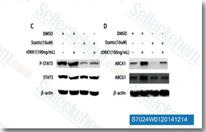
|
|
| S1155 | NSC 74859 (S3I-201) | NSC 74859 (S3I-201) shows potent inhibition of STAT3 DNA-binding activity with IC50 of 86 μM in cell-free assays, and low activity towards STAT1 and STAT5. |
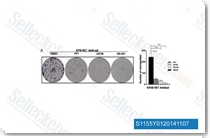
|
|
| S1491 | Fludarabine | Fludarabine is a STAT1 activation inhibitor which causes a specific depletion of STAT1 protein (and mRNA) but not of other STATs. Also a DNA synthesis inhibitor in vascular smooth muscle cells. Fludarabine induces apoptosis. |
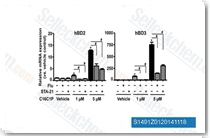
|
|
| S1014 | Bosutinib | Bosutinib is a novel, dual Src/Abl inhibitor with IC50 of 1.2 nM and 1 nM in cell-free assays, respectively. Bosutinib also effectively decreases the activity of PI3K/AKT/mTOR, MAPK/ERK and JAK/STAT3 signaling pathways by blocking the phosphorylation levels of p-ERK, p-S6, and p-STAT3. Bosutinib promotes autophagy. |
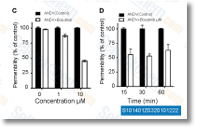
|
|
| S2796 | WP1066 | WP1066 is a novel inhibitor of JAK2 and STAT3 with IC50 of 2.30 μM and 2.43 μM in HEL cells; shows activity to JAK2, STAT3, STAT5, and ERK1/2 not JAK1 and JAK3. WP1066 induces apoptosis. Phase 1. |
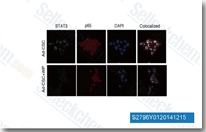
|
|
| S1396 | Resveratrol | Resveratrol has a wide spectrum of targets including cyclooxygenases(i.e. COX, IC50=1.1 μM), lipooxygenases(LOX, IC50=2.7 μM), kinases, sirtuins and other proteins. It has anti-cancer, anti-inflammatory, blood-sugar-lowering and other beneficial cardiovascular effects. Resveratrol induces mitophagy/autophagy and autophagy-dependent apoptosis. |
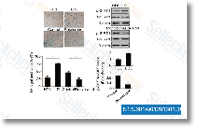
|
|
| S2285 | Cryptotanshinone (Tanshinone C) | Cryptotanshinone (Tanshinone C) is a STAT3 inhibitor with IC50 of 4.6 μM in a cell-free assay, strongly inhibits phosphorylation of STAT3 Tyr705, with a small effect on STAT3 Ser727, but none against STAT1 nor STAT5. Cryptotanshinone induces ROS-dependent autophagy and mitochondria-mediated apoptosis. |
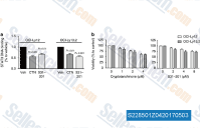
|
|
| S2824 | TPCA-1 | TPCA-1 (GW683965) is an inhibitor of IKK-2 with IC50 of 17.9 nM in a cell-free assay, inhibits NF-κB pathway, exhibits 22-fold selectivity over IKK-1. TPCA-1 is also an inhibitor of STAT3 and enhances apoptosis. |
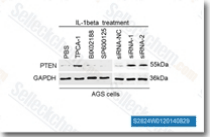
|
|
| S7337 | SH-4-54 | SH-4-54 is a potent STAT inhibitor with KD of 300 nM and 464 nM for STAT3 and STAT5, respectively. |
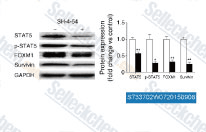
|
|
| S8605 | C188-9 | C188-9 (TTI 101) is a potent inhibitor of STAT3 that binds to STAT3 with high affinity (KD=4.7±0.4 nM). C188-9 is well tolerated in mice, shows good oral bioavailability, and is concentrated in tumors. |
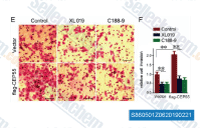
|
|
| S3030 | Niclosamide | Niclosamide can inhibit DNA replication and inhibit STAT3 with IC50 of 0.7 μM in a cell-free assay. Niclosamide selectively inhibited the phosphorylation of STAT3 and had no obvious inhibition against the activation of other homologues (e.g., STAT1 and STAT5). |
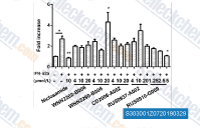
|
|
| S7769 | BP-1-102 | BP-1-102 is a potent, orally bioavailable and selective STAT3 inhibitor, binds Stat3 with an affinity Kd of 504 nM and blocks Stat3-phospho-tyrosine (pTyr) peptide interactions and Stat3 activation at 4-6.8 μM. |
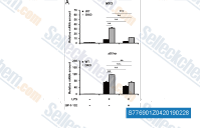
|
|
| S7977 | Napabucasin (BBI608) | Napabucasin (BBI608) is an orally available Stat3 and cancer cell stemness inhibitor. | ||
| S7501 | HO-3867 | HO-3867, an analog of curcumin, is a selective STAT3 inhibitor that inhibits its phosphorylation, transcription, and DNA binding without affecting the expression of other active STATs. HO-3867 induces apoptosis. |
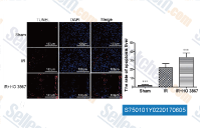
|
|
| S4182 | Nifuroxazide | Nifuroxazide is a cell-permeable and orally available nitrofuran-based antidiarrheal agent that effectively suppresses the activation of cellular STAT1/3/5 transcription activity with IC50 of 3 μM against IL-6-induced STAT3 activation in U3A cells. |
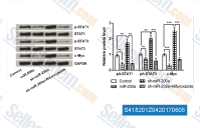
|
|
| S8685 | AS1517499 | AS1517499 is a novel and potent STAT6 inhibitor with an IC50 value of 21 nM. | ||
| S9015 | Homoharringtonine (HHT) | Homoharringtonine (HHT), a plant alkaloid with antitumor properties, inhibits protein translation by preventing the initial elongation step of protein synthesis via an interaction with the ribosomal A-site. Homoharringtonine reversiblely inhibits IL-6-induced STAT3 Tyrosine 705 phosphorylation and reduced anti-apoptotic proteins expression. | ||
| S2265 | Artesunate | Artesunate is a part of the artemisinin group of agents with an IC50 of < 5 μM for small cell lung carcinoma cell line H69. It is a potential inhibitor of STAT-3 and exhibits selective cytotoxicity of cancer cells over normal cells in vitro; A potent inhibitor of EXP1. | ||
| S6784 | STAT5-IN-1 | STAT5-IN-1 is a potent and selective STAT5 inhibitor with IC50 of 47 μM for STAT5β isoform. | ||
| S7951 | Ochromycinone (STA-21) | Ochromycinone (STA-21) is a selective STAT3 inhibitor. | ||
| S8561 | HJC0152 | HJC0152 is a signal transducer and activator of transcription 3 (STAT3) inhibitor with remarkably improved aqueous solubility. | ||
| S9664 | Colivelin | Colivelin (CLN) is a brain-penetrant neuroprotective peptide with potent long-term capacity against Aβ deposition, neuronal apoptosis, and synaptic plasticity deficits in neurodegenerative disease. Colivelin is an activator of STAT3. | ||
| S8197 | APTSTAT3-9R | APTSTAT3-9R is a specific STAT3-binding peptide with addition of a cell-penetrating motif. The treatment of APTSTAT3-9R in various types of cancer cells blocks STAT3 phosphorylation and reduces expression of STAT targets. | ||
| S0818 | STAT3-IN-1 | STAT3-IN-1 (compound 7d) is an excellent, selective and orally active inhibitor of STAT3 with IC50 of 1.82 μM and 2.14 μM in HT29 and MDA-MB 231 cells, respectively. STAT3-IN-1 induces apoptosis of tumor cells. | ||
| S0986 | SC-1 | SC-1 (1-(4-Chloro-3-(trifluoromethyl)phenyl)-3-(4-(4-cyanophenoxy)phenyl)urea, STAT3-IN-7), a Sorafenib analogue and potently inhibits the phosphorylation of STAT3, induces cell apoptosis through SHP-1 dependent STAT3 inactivation. | ||
| S3292 | Falcarindiol | Falcarindiol (FAD, (3R,8S)-Falcarindiol, FaDOH) is a natural polyacetylene compound found rich in many plants of the Umbelliferae family. Falcarindiol suppresses LPS-stimulated expression of inducible nitric oxide synthase (iNOS), tumor necrosis factor alpha (TNFα), interleukin-6 (IL-6), and interleukin-1 beta (IL-1β). Falcarindiol attenuates the LPS-induced activation of JNK, ERK, STAT1, and STAT3 signaling molecules. | ||
| S4358 | Pimozide | Pimozide (Orap, R6238) is an antagonist of Dopamine Receptors with Ki of 0.83 nM, 3.0 nM and 6600 nM for dopamine D3, D2 and D1 receptors, respectively. Pimozide also exhibits binding affinity at 5-HT1A and α1-adrenoceptor with Ki of 310 nM and 39 nM, respectively. Pimozide is an antipsychotic drug with anti-tumor activity and suppresses STAT3 and STAT5 activity. | ||
| S6898 | RCM-1 | RCM-1 is a nontoxic inhibitor of Forkhead box M1 (FOXM1) that suppresses goblet cell metaplasia and prevents IL-13 and STAT6 signaling in allergen-exposed mice. RCM-1 decreases carcinogenesis and nuclear β-catenin. | ||
| S0981 | BD750 | BD750 is an immunosuppressant and a dual inhibitor of JAK3 and STAT5 that inhibits IL-2-induced JAK3/STAT5-dependent T cell proliferation with IC50 of 1.5 μM and 1.1 μM for mouse and human T-cell proliferation, respectively. | ||
| E1124 | Narciclasine | Narciclasine (Lycoricidinol), an isocarbostyril alkaloid narciclasine, targets STAT3 via distinct mechanisms in tamoxifen-resistant breast cancer cells. Narciclasine suppresses phosphorylation, activation, dimerization, and nuclear translocation of STAT3 by directly binding with the STAT3 SH2 domain and leads STAT3 degradation. Narciclasine is a plant growth modulator. Narciclasine modulates the Rho/Rho kinase/LIM kinase/cofilin signaling pathway, greatly increasing GTPase RhoA activity as well as inducing actin stress fiber formation in a RhoA-dependent manner. | ||
| S6919 | Brevilin A | Brevilin A (6-O-Angeloylplenolina), a sesquiterpene lactone isolated from Centipeda minima, is a selective inhibitor of STAT3 and attenuates the JAKs activity by blocking the JAKs tyrosine kinase domain JH1. Brevilin A induces apoptosis and autophagy of colon adenocarcinoma cell CT26 via mitochondrial pathway and PI3K/AKT/mTOR inactivation. | ||
| S7923 | SH5-07 (SH-5-07) | SH5-07 is a robust hydroxamic acid-based STAT3 inhibitor, which induce antitumor cell effects in vitro and antitumor response in vivo against human glioma and breast cancer models. | ||
| S3810 | Scutellarin | Scutellarin (Breviscapine, Breviscapin, Scutellarein-7-glucuronide), the major active principal flavonoids extracted from the Chinese herbal medicines Scutellaria baicalensis and Erigeron breviscapus (Vant.) Hand-Mazz, has many pharmacological effects, such as antioxidant, antitumor, antiviral, and antiinflammatory activities. Scutellarin can down-regulates the STAT3/Girdin/Akt signaling in HCC cells, and inhibits RANKL-mediated MAPK and NF-κB signaling pathway in osteoclasts. | ||
| S3745 | Balsalazide disodium | Balsalazide Disodium is the disodium salt form of balsalazide, an aminosalicylate and oral prodrug that is enzymatically cleaved in the colon to produce the anti-inflammatory agent mesalazine. Balsalazide Disodium suppress colitis-associated carcinogenesis through modulation of IL-6/STAT3 pathway. | ||
| S4842 | Balsalazide | Balsalazide (Colazal, Giazo), an aminosalicylate and oral prodrug, is enzymatically cleaved in the colon to produce the anti-inflammatory agent mesalazine. Balsalazide suppress colitis-associated carcinogenesis through modulation of IL-6/STAT3 pathway. | ||
| S0915 | Morusin | Morusin (Mulberrochromene) is an inhibitor of NF-κB and STAT3. Morusin is a prenylated flavonoid isolated from Marsdenia australis with antitumor, antioxidant, and anti-bacteria properties. | ||
| S0918 | Ginkgolic acid C17:1 | Ginkgolic acid C17:1 (GAC 17:1) inhibits constitutive activation of STAT3 through the abrogation of upstream JAK2 and Src. Ginkgolic acid C17:1 can induce the substantial expression of PTEN and SHP-1. Ginkgolic acid C17:1 induces apoptosis of tumor cells. | ||
| S3267 | Nicotiflorin (Kaempferol-3-O-rutinoside) | Nicotiflorin (Kaempferol-3-O-rutinoside), a flavonoid extracted from Carthamus tinctorius, alters the shape and structure of injured neurons, decreases the number of apoptotic cells, down-regulates expression of p-JAK2, p-STAT3, caspase-3, and Bax and decreases Bax immunoredactivity, and increases Bcl-2 protein expression and immunoreactivity. | ||
| S5554 | Lanatoside C | Lanatoside C is a cardiac glycoside with antiviral and anti-tumor activity. Lanatoside C induces G2/M cell cycle arrest and induces autophagy and apoptosis via attenuating MAPK, Wnt, JAK-STAT, and PI3K/AKT/mTOR signaling pathways. | ||
| E3177 | Centipeda Minima Extract | Centipeda Minima Extract is extracted from the medicinal herb Centipeda minima, has promising anticancer activities. | ||
| S8989 | Xanthatin | Xanthatin is a sesquiterpene lactone isolated from Xanthium strumarium leaves, which can inhibit the nuclear factor kappa-B (NF-κB), mitogen-activated protein kinase (MAPK) and signal transducer and activator of transcription (STATs) signaling pathways. | ||
| S0949 | Cucurbitacin IIb | Cucurbitacin IIb (CuIIb, Dihydrocucurbitacin F, 25-deacetyl hemslecin A) inhibits phosphorylation of STAT3, JNK and Erk1/2, enhances the phosphorylation of IκB and NF-κB, blocks nuclear translocation of NF-κB and decreases mRNA levels of IκBα and TNF-α. Cucurbitacin IIb exhibits anti-inflammatory activity and induces apoptosis. Cucurbitacin IIb is isolated from Hemsleya amabilis. | ||
| E3098 | Fritillariae Cirrhosae Bulbus Extract | Fritillariae Cirrhosae Bulbus Extract is obtained from Fritillariae cirrhosae, mediates apoptosis through a STAT1 and STAT4-mediated co-regulatory network, which may be the key novel mechanism for its antitumor activity. | ||
| E0485 | Stafia-1 | Stafia-1 is the first STAT5a inhibitor that inhibits STAT5a (IC50=22.2 μM, Ki=10.9 μM) with at least 9‐fold selectivity over STAT5b and higher selectivity against other STAT family members. | ||
| E2644 | Tetramethylcurcumin | Tetramethylcurcumin (FLLL31), a small-molecule signal transducer and activator of transcription 3 (STAT3) inhibitor derived from curcumin, binds selectively to Janus kinase 2 and the STAT3 Src homology-2 domain, which serve crucial roles in STAT3 dimerization and signal transduction. | ||
| E0011 | Linderalactone | Linderalactone inhibits human lung cancer growth by modulating the expression of apoptosis-related proteins (Bax and Bcl-2) with an IC50 of 15 µM in A-549 cells. Linderalactone induces G2/M cell cycle arrest and could also suppress the JAK/STAT signalling pathway. Linderalactone can be isolated from Radix linderae. | ||
| S8897New | SD-36 | "SD-36 is a potent, selective and efficacious PROTAC degrader of STAT3 protein with Kd of ~50 nM. It also effectively degrades mutated STAT3 proteins in cells and suppresses the transcriptional activity of STAT3 with IC50 of 10 nM. It also exerts anti-tumor activity. SD-36 is a potent, selective and efficacious PROTAC degrader of STAT3 protein with Kd of ~50 nM. It also effectively degrades mutated STAT3 proteins in cells and suppresses the transcriptional activity of STAT3 with IC50 of 10 nM. It also exerts anti-tumor activity. | ||
| E3633 | Ginger Extract | Ginger Extract is extracted from Zingiber officinale Roscoe, which has antioxidant potential and regulates STAT6 and TNF- α pathways. | ||
| E3634 | Ginger Extract(1%) | Ginger Extract(1%) is extracted from Zingiber officinale Roscoe, which has antioxidant potential and regulates STAT6 and TNF- α pathways. | ||
| E0769 | Ginsenoside Rh4 | Ginsenoside Rh4 is an important active ingredient of traditional Chinese medicine ginseng, which has been shown to inhibit Wnt/β-Catenin, JAK2/STAT3, TGF-β/Smad2/3 and other signaling pathways. | ||
| S1349 | SC99 | SC99 is an orally active, selective STAT3 inhibitor targeting JAK2-STAT3 pathway by docking into the ATP-binding pocket of JAK2, also inhibits phosphorylation of JAK2and STAT3 with no effects on the other kinases associated with STAT3 signaling. | ||
| E0700 | cucurbitacin E | Cucurbitacin E (α-Elaterin; α-Elaterine), a tetracyclic triterpene derived from the climbing stem of Cucumic melo L, is an inhibitor of JAK2 and STAT3. | ||
| E2398 | STAT5-IN-2 | STAT5-IN-2 inhibits the growth of acute and chronic myeloid leukemia cells and the phosphorylation and transcriptional activity of STAT5, but not STAT3, AKT, or Erk1/2 phosphorylation, with minimal effects on bone marrow stromal cells that play vital functions in the microenvironment of hematopoietic and leukemic cells. | ||
| S0445 | SC-43 | SC-43, a sorafenib derivative, is an agonist of Src-homology protein tyrosine phosphatase-1 (SHP-1/PTPN6) and reduces liver fibrosis. SC-43 reduces p-STAT3 and induces apoptosis with anti-tumor activity. | ||
| S8152 | Cucurbitacin I | Cucurbitacin-I (Elatericin B, JSI 124, NSC 521777), a natural cell-permeable triterpenoid isolated from Cucurbitaceae, is a novel selective inhibitor of JAK2/STAT3. |
||
| S0456 | inS3-54-A18 | inS3-54A18 is a potent inhibitor of STAT3 with anti-cancer properties. | ||
| S9920 | GYY4137 | GYY4137 is a novel, water-soluble hydrogen sulfide (H2S)–releasing molecule with vasodilator and antihypertensive activity. GYY4137 shows potent anti-hepatocellular carcinoma activity through blocking the STAT3 pathway. GYY4137 also shows anti-inflammatory activity.Stock solutions should be stored under nitrogen, sealed. | ||
| S7024 | Stattic | Stattic, the first nonpeptidic small molecule, potently inhibits STAT3 activation and nuclear translocation with IC50 of 5.1 μM in cell-free assays, highly selectivity over STAT1. Stattic induces apoptosis. |

|
|
| S1155 | NSC 74859 (S3I-201) | NSC 74859 (S3I-201) shows potent inhibition of STAT3 DNA-binding activity with IC50 of 86 μM in cell-free assays, and low activity towards STAT1 and STAT5. |

|
|
| S1491 | Fludarabine | Fludarabine is a STAT1 activation inhibitor which causes a specific depletion of STAT1 protein (and mRNA) but not of other STATs. Also a DNA synthesis inhibitor in vascular smooth muscle cells. Fludarabine induces apoptosis. |

|
|
| S1014 | Bosutinib | Bosutinib is a novel, dual Src/Abl inhibitor with IC50 of 1.2 nM and 1 nM in cell-free assays, respectively. Bosutinib also effectively decreases the activity of PI3K/AKT/mTOR, MAPK/ERK and JAK/STAT3 signaling pathways by blocking the phosphorylation levels of p-ERK, p-S6, and p-STAT3. Bosutinib promotes autophagy. |

|
|
| S2796 | WP1066 | WP1066 is a novel inhibitor of JAK2 and STAT3 with IC50 of 2.30 μM and 2.43 μM in HEL cells; shows activity to JAK2, STAT3, STAT5, and ERK1/2 not JAK1 and JAK3. WP1066 induces apoptosis. Phase 1. |

|
|
| S1396 | Resveratrol | Resveratrol has a wide spectrum of targets including cyclooxygenases(i.e. COX, IC50=1.1 μM), lipooxygenases(LOX, IC50=2.7 μM), kinases, sirtuins and other proteins. It has anti-cancer, anti-inflammatory, blood-sugar-lowering and other beneficial cardiovascular effects. Resveratrol induces mitophagy/autophagy and autophagy-dependent apoptosis. |

|
|
| S2285 | Cryptotanshinone (Tanshinone C) | Cryptotanshinone (Tanshinone C) is a STAT3 inhibitor with IC50 of 4.6 μM in a cell-free assay, strongly inhibits phosphorylation of STAT3 Tyr705, with a small effect on STAT3 Ser727, but none against STAT1 nor STAT5. Cryptotanshinone induces ROS-dependent autophagy and mitochondria-mediated apoptosis. |

|
|
| S2824 | TPCA-1 | TPCA-1 (GW683965) is an inhibitor of IKK-2 with IC50 of 17.9 nM in a cell-free assay, inhibits NF-κB pathway, exhibits 22-fold selectivity over IKK-1. TPCA-1 is also an inhibitor of STAT3 and enhances apoptosis. |

|
|
| S7337 | SH-4-54 | SH-4-54 is a potent STAT inhibitor with KD of 300 nM and 464 nM for STAT3 and STAT5, respectively. |

|
|
| S8605 | C188-9 | C188-9 (TTI 101) is a potent inhibitor of STAT3 that binds to STAT3 with high affinity (KD=4.7±0.4 nM). C188-9 is well tolerated in mice, shows good oral bioavailability, and is concentrated in tumors. |

|
|
| S3030 | Niclosamide | Niclosamide can inhibit DNA replication and inhibit STAT3 with IC50 of 0.7 μM in a cell-free assay. Niclosamide selectively inhibited the phosphorylation of STAT3 and had no obvious inhibition against the activation of other homologues (e.g., STAT1 and STAT5). |

|
|
| S7769 | BP-1-102 | BP-1-102 is a potent, orally bioavailable and selective STAT3 inhibitor, binds Stat3 with an affinity Kd of 504 nM and blocks Stat3-phospho-tyrosine (pTyr) peptide interactions and Stat3 activation at 4-6.8 μM. |

|
|
| S7977 | Napabucasin (BBI608) | Napabucasin (BBI608) is an orally available Stat3 and cancer cell stemness inhibitor. | ||
| S7501 | HO-3867 | HO-3867, an analog of curcumin, is a selective STAT3 inhibitor that inhibits its phosphorylation, transcription, and DNA binding without affecting the expression of other active STATs. HO-3867 induces apoptosis. |

|
|
| S4182 | Nifuroxazide | Nifuroxazide is a cell-permeable and orally available nitrofuran-based antidiarrheal agent that effectively suppresses the activation of cellular STAT1/3/5 transcription activity with IC50 of 3 μM against IL-6-induced STAT3 activation in U3A cells. |

|
|
| S8685 | AS1517499 | AS1517499 is a novel and potent STAT6 inhibitor with an IC50 value of 21 nM. | ||
| S9015 | Homoharringtonine (HHT) | Homoharringtonine (HHT), a plant alkaloid with antitumor properties, inhibits protein translation by preventing the initial elongation step of protein synthesis via an interaction with the ribosomal A-site. Homoharringtonine reversiblely inhibits IL-6-induced STAT3 Tyrosine 705 phosphorylation and reduced anti-apoptotic proteins expression. | ||
| S2265 | Artesunate | Artesunate is a part of the artemisinin group of agents with an IC50 of < 5 μM for small cell lung carcinoma cell line H69. It is a potential inhibitor of STAT-3 and exhibits selective cytotoxicity of cancer cells over normal cells in vitro; A potent inhibitor of EXP1. | ||
| S6784 | STAT5-IN-1 | STAT5-IN-1 is a potent and selective STAT5 inhibitor with IC50 of 47 μM for STAT5β isoform. | ||
| S7951 | Ochromycinone (STA-21) | Ochromycinone (STA-21) is a selective STAT3 inhibitor. | ||
| S8561 | HJC0152 | HJC0152 is a signal transducer and activator of transcription 3 (STAT3) inhibitor with remarkably improved aqueous solubility. | ||
| S8197 | APTSTAT3-9R | APTSTAT3-9R is a specific STAT3-binding peptide with addition of a cell-penetrating motif. The treatment of APTSTAT3-9R in various types of cancer cells blocks STAT3 phosphorylation and reduces expression of STAT targets. | ||
| S0818 | STAT3-IN-1 | STAT3-IN-1 (compound 7d) is an excellent, selective and orally active inhibitor of STAT3 with IC50 of 1.82 μM and 2.14 μM in HT29 and MDA-MB 231 cells, respectively. STAT3-IN-1 induces apoptosis of tumor cells. | ||
| S0986 | SC-1 | SC-1 (1-(4-Chloro-3-(trifluoromethyl)phenyl)-3-(4-(4-cyanophenoxy)phenyl)urea, STAT3-IN-7), a Sorafenib analogue and potently inhibits the phosphorylation of STAT3, induces cell apoptosis through SHP-1 dependent STAT3 inactivation. | ||
| S3292 | Falcarindiol | Falcarindiol (FAD, (3R,8S)-Falcarindiol, FaDOH) is a natural polyacetylene compound found rich in many plants of the Umbelliferae family. Falcarindiol suppresses LPS-stimulated expression of inducible nitric oxide synthase (iNOS), tumor necrosis factor alpha (TNFα), interleukin-6 (IL-6), and interleukin-1 beta (IL-1β). Falcarindiol attenuates the LPS-induced activation of JNK, ERK, STAT1, and STAT3 signaling molecules. | ||
| S4358 | Pimozide | Pimozide (Orap, R6238) is an antagonist of Dopamine Receptors with Ki of 0.83 nM, 3.0 nM and 6600 nM for dopamine D3, D2 and D1 receptors, respectively. Pimozide also exhibits binding affinity at 5-HT1A and α1-adrenoceptor with Ki of 310 nM and 39 nM, respectively. Pimozide is an antipsychotic drug with anti-tumor activity and suppresses STAT3 and STAT5 activity. | ||
| S6898 | RCM-1 | RCM-1 is a nontoxic inhibitor of Forkhead box M1 (FOXM1) that suppresses goblet cell metaplasia and prevents IL-13 and STAT6 signaling in allergen-exposed mice. RCM-1 decreases carcinogenesis and nuclear β-catenin. | ||
| S0981 | BD750 | BD750 is an immunosuppressant and a dual inhibitor of JAK3 and STAT5 that inhibits IL-2-induced JAK3/STAT5-dependent T cell proliferation with IC50 of 1.5 μM and 1.1 μM for mouse and human T-cell proliferation, respectively. | ||
| E1124 | Narciclasine | Narciclasine (Lycoricidinol), an isocarbostyril alkaloid narciclasine, targets STAT3 via distinct mechanisms in tamoxifen-resistant breast cancer cells. Narciclasine suppresses phosphorylation, activation, dimerization, and nuclear translocation of STAT3 by directly binding with the STAT3 SH2 domain and leads STAT3 degradation. Narciclasine is a plant growth modulator. Narciclasine modulates the Rho/Rho kinase/LIM kinase/cofilin signaling pathway, greatly increasing GTPase RhoA activity as well as inducing actin stress fiber formation in a RhoA-dependent manner. | ||
| S6919 | Brevilin A | Brevilin A (6-O-Angeloylplenolina), a sesquiterpene lactone isolated from Centipeda minima, is a selective inhibitor of STAT3 and attenuates the JAKs activity by blocking the JAKs tyrosine kinase domain JH1. Brevilin A induces apoptosis and autophagy of colon adenocarcinoma cell CT26 via mitochondrial pathway and PI3K/AKT/mTOR inactivation. | ||
| S7923 | SH5-07 (SH-5-07) | SH5-07 is a robust hydroxamic acid-based STAT3 inhibitor, which induce antitumor cell effects in vitro and antitumor response in vivo against human glioma and breast cancer models. | ||
| S3810 | Scutellarin | Scutellarin (Breviscapine, Breviscapin, Scutellarein-7-glucuronide), the major active principal flavonoids extracted from the Chinese herbal medicines Scutellaria baicalensis and Erigeron breviscapus (Vant.) Hand-Mazz, has many pharmacological effects, such as antioxidant, antitumor, antiviral, and antiinflammatory activities. Scutellarin can down-regulates the STAT3/Girdin/Akt signaling in HCC cells, and inhibits RANKL-mediated MAPK and NF-κB signaling pathway in osteoclasts. | ||
| S0915 | Morusin | Morusin (Mulberrochromene) is an inhibitor of NF-κB and STAT3. Morusin is a prenylated flavonoid isolated from Marsdenia australis with antitumor, antioxidant, and anti-bacteria properties. | ||
| S0918 | Ginkgolic acid C17:1 | Ginkgolic acid C17:1 (GAC 17:1) inhibits constitutive activation of STAT3 through the abrogation of upstream JAK2 and Src. Ginkgolic acid C17:1 can induce the substantial expression of PTEN and SHP-1. Ginkgolic acid C17:1 induces apoptosis of tumor cells. | ||
| S3267 | Nicotiflorin (Kaempferol-3-O-rutinoside) | Nicotiflorin (Kaempferol-3-O-rutinoside), a flavonoid extracted from Carthamus tinctorius, alters the shape and structure of injured neurons, decreases the number of apoptotic cells, down-regulates expression of p-JAK2, p-STAT3, caspase-3, and Bax and decreases Bax immunoredactivity, and increases Bcl-2 protein expression and immunoreactivity. | ||
| S5554 | Lanatoside C | Lanatoside C is a cardiac glycoside with antiviral and anti-tumor activity. Lanatoside C induces G2/M cell cycle arrest and induces autophagy and apoptosis via attenuating MAPK, Wnt, JAK-STAT, and PI3K/AKT/mTOR signaling pathways. | ||
| E3177 | Centipeda Minima Extract | Centipeda Minima Extract is extracted from the medicinal herb Centipeda minima, has promising anticancer activities. | ||
| S8989 | Xanthatin | Xanthatin is a sesquiterpene lactone isolated from Xanthium strumarium leaves, which can inhibit the nuclear factor kappa-B (NF-κB), mitogen-activated protein kinase (MAPK) and signal transducer and activator of transcription (STATs) signaling pathways. | ||
| S0949 | Cucurbitacin IIb | Cucurbitacin IIb (CuIIb, Dihydrocucurbitacin F, 25-deacetyl hemslecin A) inhibits phosphorylation of STAT3, JNK and Erk1/2, enhances the phosphorylation of IκB and NF-κB, blocks nuclear translocation of NF-κB and decreases mRNA levels of IκBα and TNF-α. Cucurbitacin IIb exhibits anti-inflammatory activity and induces apoptosis. Cucurbitacin IIb is isolated from Hemsleya amabilis. | ||
| E0485 | Stafia-1 | Stafia-1 is the first STAT5a inhibitor that inhibits STAT5a (IC50=22.2 μM, Ki=10.9 μM) with at least 9‐fold selectivity over STAT5b and higher selectivity against other STAT family members. | ||
| E2644 | Tetramethylcurcumin | Tetramethylcurcumin (FLLL31), a small-molecule signal transducer and activator of transcription 3 (STAT3) inhibitor derived from curcumin, binds selectively to Janus kinase 2 and the STAT3 Src homology-2 domain, which serve crucial roles in STAT3 dimerization and signal transduction. | ||
| E0011 | Linderalactone | Linderalactone inhibits human lung cancer growth by modulating the expression of apoptosis-related proteins (Bax and Bcl-2) with an IC50 of 15 µM in A-549 cells. Linderalactone induces G2/M cell cycle arrest and could also suppress the JAK/STAT signalling pathway. Linderalactone can be isolated from Radix linderae. | ||
| E0769 | Ginsenoside Rh4 | Ginsenoside Rh4 is an important active ingredient of traditional Chinese medicine ginseng, which has been shown to inhibit Wnt/β-Catenin, JAK2/STAT3, TGF-β/Smad2/3 and other signaling pathways. | ||
| S1349 | SC99 | SC99 is an orally active, selective STAT3 inhibitor targeting JAK2-STAT3 pathway by docking into the ATP-binding pocket of JAK2, also inhibits phosphorylation of JAK2and STAT3 with no effects on the other kinases associated with STAT3 signaling. | ||
| E0700 | cucurbitacin E | Cucurbitacin E (α-Elaterin; α-Elaterine), a tetracyclic triterpene derived from the climbing stem of Cucumic melo L, is an inhibitor of JAK2 and STAT3. | ||
| E2398 | STAT5-IN-2 | STAT5-IN-2 inhibits the growth of acute and chronic myeloid leukemia cells and the phosphorylation and transcriptional activity of STAT5, but not STAT3, AKT, or Erk1/2 phosphorylation, with minimal effects on bone marrow stromal cells that play vital functions in the microenvironment of hematopoietic and leukemic cells. | ||
| S0445 | SC-43 | SC-43, a sorafenib derivative, is an agonist of Src-homology protein tyrosine phosphatase-1 (SHP-1/PTPN6) and reduces liver fibrosis. SC-43 reduces p-STAT3 and induces apoptosis with anti-tumor activity. | ||
| S8152 | Cucurbitacin I | Cucurbitacin-I (Elatericin B, JSI 124, NSC 521777), a natural cell-permeable triterpenoid isolated from Cucurbitaceae, is a novel selective inhibitor of JAK2/STAT3. |
||
| S0456 | inS3-54-A18 | inS3-54A18 is a potent inhibitor of STAT3 with anti-cancer properties. | ||
| S9920 | GYY4137 | GYY4137 is a novel, water-soluble hydrogen sulfide (H2S)–releasing molecule with vasodilator and antihypertensive activity. GYY4137 shows potent anti-hepatocellular carcinoma activity through blocking the STAT3 pathway. GYY4137 also shows anti-inflammatory activity.Stock solutions should be stored under nitrogen, sealed. | ||
| S9664 | Colivelin | Colivelin (CLN) is a brain-penetrant neuroprotective peptide with potent long-term capacity against Aβ deposition, neuronal apoptosis, and synaptic plasticity deficits in neurodegenerative disease. Colivelin is an activator of STAT3. | ||
| S3745 | Balsalazide disodium | Balsalazide Disodium is the disodium salt form of balsalazide, an aminosalicylate and oral prodrug that is enzymatically cleaved in the colon to produce the anti-inflammatory agent mesalazine. Balsalazide Disodium suppress colitis-associated carcinogenesis through modulation of IL-6/STAT3 pathway. | ||
| S4842 | Balsalazide | Balsalazide (Colazal, Giazo), an aminosalicylate and oral prodrug, is enzymatically cleaved in the colon to produce the anti-inflammatory agent mesalazine. Balsalazide suppress colitis-associated carcinogenesis through modulation of IL-6/STAT3 pathway. | ||
| E3633 | Ginger Extract | Ginger Extract is extracted from Zingiber officinale Roscoe, which has antioxidant potential and regulates STAT6 and TNF- α pathways. | ||
| E3634 | Ginger Extract(1%) | Ginger Extract(1%) is extracted from Zingiber officinale Roscoe, which has antioxidant potential and regulates STAT6 and TNF- α pathways. | ||
| S8897New | SD-36 | "SD-36 is a potent, selective and efficacious PROTAC degrader of STAT3 protein with Kd of ~50 nM. It also effectively degrades mutated STAT3 proteins in cells and suppresses the transcriptional activity of STAT3 with IC50 of 10 nM. It also exerts anti-tumor activity. SD-36 is a potent, selective and efficacious PROTAC degrader of STAT3 protein with Kd of ~50 nM. It also effectively degrades mutated STAT3 proteins in cells and suppresses the transcriptional activity of STAT3 with IC50 of 10 nM. It also exerts anti-tumor activity. |
Choose Selective STAT Inhibitors
Tags: STAT inhibition | STAT signaling pathway | STAT pathway | STAT cancer | STAT signaling | STAT protein | STAT activation | JAK-STAT signaling pathway | STAT3 pathway | STAT3 cancer | STAT3 inhibition | STAT3 activation | STAT phosphorylation | STAT3 protein | STAT1 inhibition | STAT1 pathway | STAT1 activation | STAT1 protein | JAK-STAT mechanism | STAT3 inhibitors in clinical trials | STAT3 inhibitor in vivo | STAT inhibitor review








































